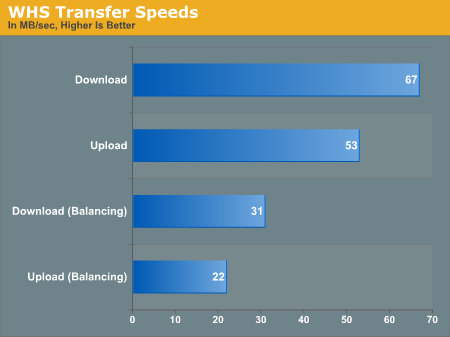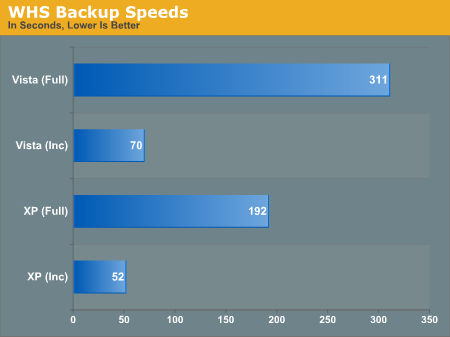A New Kind of Home Computer: Windows Home Server Preview
by Ryan Smith on September 4, 2007 1:00 PM EST- Posted in
- Systems
Performance Data
Because we were only able to get our hands on a release candidate version of WHS for the performance testing, all the results here need to be taken with a grain of salt. The WHS RC is quite good, especially in comparison to rockier launches like Vista, but we expect the performance numbers in particular to have changed slightly between the RC and the final version.
It's worth noting that the network packet throttling problem with Vista is still in play as of this writing. As a result all of our tests are under Windows XP SP2 unless otherwise noted, and when they're run on Vista it is with Multimedia Class Scheduler Service disabled to prevent throttling. Although this problem has existed in Vista since it has shipped, this is about the worst time it could come to light for Microsoft. Until it's fixed, Vista users wanting to move their media off of a personal computer and onto a WHS server will definitely want to hold off on doing so. Even though the problem with throttling isn't one with WHS, the problem occurring in Vista still drags down WHS.
| Client Test Bed | |
| Processor | Intel Core 2 Quad QX6850 (3.00GHz/1333MHz) |
| RAM | G.Skill DDR2-800 (2x2GB) |
| Motherboard | Gigabyte GA-P35-DR3R (Intel P35) |
| System Platform Drivers | Intel 8.1.1.1012 |
| Hard Drive | Maxtor MaXLine Pro 500GB SATA |
| Video Cards | 1 x GeForce 8800GTX |
| Video Drivers | NV ForceWare 163.44 |
| Power Supply | OCZ GameXStream 700W |
| Desktop Resolution | 1600x1200 |
| Operating Systems | Windows Vista Ultimate 32-Bit Windows XP SP2 |
| . | |
| Server Test Bed | |
| Processor | AMD Athlon X2 4600+ (2.40GHz/400MHz) |
| RAM | OCZ DDR-400 (4x512MB) |
| Motherboard | ASUS A8N-SLI Premium (nForce 4 SLI) |
| System Platform Drivers | NV 6.69 |
| Hard Drive | 2x Western Digital Caviar Raid Edition 2(400GB) |
| Power Supply | OCZ GameXStream 700W |
| Operating Systems | Windows Home Server RC |
| . | |
We'll start with testing WHS's file server abilities by transferring files back and forth. With a gigabit network, the bottleneck will be the transfer abilities of our hard drives, so if WHS is achieving maximum performance it should be able to move data at speeds around the maximum of our hard drives. We'll be using a RAM disk on the client side to isolate the performance of WHS.
Also on this graph will be the performance of WHS while attempting to do file transfers in the middle of a balancing operation. Because of the importance in balancing data for data retention and performance reasons, WHS will sometimes need to balance folders even during times of backups and file transfers. This doesn't seem very common in our use since it's related to total use of the WHS server, but it needs to be noted all the same. WHS does seem to take steps to avoid balancing during heavy use when possible.

At 53MB/sec up and 67MB/sec down, the results are very close to those that we've seen WD RAID edition hard drives do previously. For users with gigabit networks, it looks like it's very possible for WHS to offer performance virtually equal to having the drives installed locally. Speeds while balancing aren't very impressive though, not that we expected them to be.
The other metric of WHS's performance is how it handles backups. Unlike pure file transfers, backups aren't "brain-dead" operations and require work on behalf of both the server and the client. The client needs to figure out what data is to be sent to the server, and the server is responsible for keeping all of that data organized and compressed. WHS backup performance is also heavily dependent on what else is already in the backup cache, because WHS avoids backing up anything redundant down to the cluster level.
These specific tests were run with empty caches as a worst-case scenario; actual performance of the initial backup on a new machine (as long as it's not the first machine) should be faster. These tests are being done on clean Windows installations, with the second "incremental" backup being done immediately after the first backup completes. This is more optimistic than a real incremental backup since virtually no data changes, but in doing it this way we can establish a floor for approximately how long the scan process takes. The reference sizes for these installations are 2.3GB for XP and 5.4GB for Vista, after factoring out the system page file and other files that WHS backup filters out.

Both Vista and XP turn in respectable, although not amazing backup times. Using the incremental backup as the baseline, we achieved an average backup speed of about 20MB/sec. This is well below what we've seen on our file transfer tests, but still fast enough to complete these backups in a short amount of time; since WHS doesn't have any true peers we don't have anything else to properly compare it to. In an actual deployment with real incremental backups and common data, we expect the results to be a lot closer to that of the incremental times.
We also took the liberty of backing up the XP machine again once the Vista machine was backed up in order to measure the size of the backup cache on the WHS server. Even with these clean installs, there's about 2GB of savings on the WHS server; 7.7GB of data is only taking up 5.7GB of space. Like Previous Versions on Vista, these savings should grow as more data is added to the backup cache.










128 Comments
View All Comments
n0nsense - Wednesday, September 5, 2007 - link
Server does not need to be Media Center.If you want All-in-One OS, use Linux.
Your box will be exactly what you want it to be.
yyrkoon - Wednesday, September 5, 2007 - link
I kind of view WHS as the latest WinME, but perhaps without all the software flaws that ME had. Meaning I think it *may* have been a good concept in theory, but fell short of being a true server OS. I was on the early beta program for this OS, and could not help but think this was a product for the less than technically inclined(IE Servers for dumbies).Right now, I do not think I would even consider WHS seriously, unless they made some radical changes. I mean why even bother, you have Linux(prefferably Debian in my case), or even WinXP which seems to be more technologically advanced by comparrison(in those areas that matter to me anyhow). Sure, the duplication of files for 'redundancy' on multiple drives may seem nice to those less than experienced users, but those of us who would likely use this product are already aware of rsync based *free* Windows appplications that do such a task already.
Just the next 'red headed step child' in OSes as far as I am concerned.
imaheadcase - Wednesday, September 5, 2007 - link
You are completely wrong in every aspect. esp the winME part, that was completely wrong and in no way close.WHS appeals to everyone, including technically inclined, could care less about super advanced features. WHS has what everyone has been asking for in a server for a long time, simplicity and ease of use. The stuff you described is a SMALL fraction of people, even then those people see the appeal of WHS.
imaheadcase - Wednesday, September 5, 2007 - link
You should of noted that the network throttling bug only effects certain users of vista. Lots of people, myself included, have not encountered such bug. Even then, its not worth saying "vista users should definitely want to hold off on doing so." since its not a drastic decline that would prevent such transfers. Especially since everyone is going to do these big backups when not at computer.That whole paragraph is misleading.
Jeff7181 - Tuesday, September 4, 2007 - link
If the prebuilt boxes are reasonably priced or the OEM licenses are reasonably priced I'm going to be buying one.I'm using the beta version of it right now, and in the past I have restored single files/directories with the backup utility and I actually just now got done doing a full restore of an NT volume because a family member filled the computer with viruses so I figured it would be the perfect time to try it out. I wiped out the partition, then put the Client Restore CD in the drive and a few clicks of the mouse later it was restoring all 25 GB of my primary partition over my LAN. Finished in under 2 hours... had to run scandisk to fix some orphaned files and whatnot, but it's working as if nothing happened now. And an unintended side effect is that it appears the MFT was completely rewritten and consolidated into a couple contiguous chunks on the hard drive if I Analyze the drive in Disk Defragmenter.
imaheadcase - Wednesday, September 5, 2007 - link
They won't be reasonably priced if HP media center version is around the same as others are priced. They are around $500-700 with about 2x300gig hardrives (or 350gig i forget).The article mentioned they are going to offer better hardware that what is needed, so im sure that is going to make them more expensive than if you put something together on the cheap. Long as you can get the hardware for a cheap server off the internet that is required for the OS you are good.
AlexWade - Tuesday, September 4, 2007 - link
Have you tried file sharing in XP Pro or Vista Ultimate? It is less painful and a lot easier to give yourself a root canal. I've followed Microsoft's instructions step-by-step with no success. Then, come to find out, you have to modify a registry key to get it to work. But that only works on half the computers out there. Even if you turn the firewall off and every single service on, it still won't file share.Why is it so hard for Windows to get file sharing right? It worked flawlessly in 2000 and in XP Home? It is part of XP Pro's and Vista Ultimate extra security. Needless to say, if Microsoft would get it right the first time, a cheap computer would work just as well as Home Server.
Microsoft makes a broken product to sell you another product.
leexgx - Tuesday, September 4, 2007 - link
found windows 2000 best os for it as it has no 10 connection user limitsmindless1 - Wednesday, September 5, 2007 - link
IIRC, Win2k Pro does have a 10 concurrent inbound connection limit which 2K Server raises.leexgx - Wednesday, September 5, 2007 - link
win2k has no limits